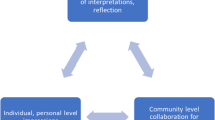Abstract
The pressure to internationalize across the higher education sector in Japan continues. Significant effort has been directed at the expansion of English as a medium of instruction (EMI) departments, and degree programs, combined with efforts aimed at increasing the attractiveness of Japanese universities for rising numbers of international students. This complex setting has direct implications for English for Academic Purposes (EAP) programs that seek to ready Japanese students for such challenging environments. This chapter describes one such pilot research project involving the controlled introduction of international students to a Japan-based EAP speaking and listening class in an attempt to (a) gauge the academic, communicative, and related study benefits for the EAP students involved, (b) reveal any indications that the program could assist in efforts to improve the campus culture and relationships between Japanese and international students, and (c) ultimately determine the potential worth of implementing such a program across the EAP curriculum.
The findings from the pilot study suggest that, overall, the introduction of international students to a preparatory EAP program provided a range of benefits to the participating Japanese students who were all preparing to enter an EMI environment in Japan. In addition, despite limited feedback, international students also responded very positively regarding their experiences in the program. Although reporting and displaying high levels of anxiety, all of the EAP participants expressed a clear desire to continue onward and expose themselves to further challenge during the program. The study produced a number of key findings showing that the EAP participants, despite being highly motivated to actively interact and share ideas with international students, (a) initially struggled to freely engage in cross-cultural academic discussions but (b) could eventually do so in an effective manner when given time and targeted instruction and that they (c) found their integrated discussions to be an excellent motivator and informer for not only their communicative development but also the progressive evolution of their academic skills. This small pilot study also uncovered findings that may require sober reflection for those engaged in preparatory EAP programs in Japan, especially those that precede EMI curriculums featuring multicultural student populations.
Access this chapter
Tax calculation will be finalised at checkout
Purchases are for personal use only
Similar content being viewed by others
References
Balint, D. M. (2010). Factors affecting learner satisfaction in EFL program evaluation. Doctoral dissertation. Retrieved from Linguistics and Language Behavior Abstracts (LLBA). (201012718).
Brown, H. (2014). Contextual factors driving the growth of undergraduate English-medium instruction programmes at universities in Japan. The Asian Journal of Applied Linguistics, 1(1), 50–63.
Dimova, S., Hultgren, A. K., & Jensen, C. (Eds.). (2015). English-medium instruction in European higher education. Berlin: Walter de Gruyter.
Dörnyei, Z. (2005). The psychology of the language learner. Mahwah: Lawrence Erlbaum Associates.
Han, E. (2007). Academic discussion tasks: A study of EFL students’ perspectives. Asian EFL Journal, 9(1), 8–21.
Higgins, R. M., & Brady, A. (2016). Language policy, planning, and enactment: The necessity and empowering potential at the local level. Current Issues in Language Planning, 17(3–4), 242–259.
Killick, D. (2015). Developing the global student. New York: Routledge.
Murphey, T. (1996). Changing language learning beliefs: “Appreshiating” mistakes. Asian Journal of English Language Teaching, 6, 77–84.
Nonaka, K. (1990). The fear of making errors. Cross Currents, 17(1), 29–36.
Saito, H. (2000). Perception and expectations of classroom behavior of Japanese English language learners and their teachers. Doctoral dissertation, Retrieved from Linguistics and Language Behavior Abstracts (LLBA). (200107647).
Shawer, S., Gilmore, D., & Banks-Joseph, S. (2009). Learner-driven EFL curriculum development at the classroom level. International Journal of Teaching and Learning in Higher Education, 20(2), 125–143.
Sim, M. S. (2004). Have no fear: An investigation into the possible existence and prevalence of cultural traits and beliefs across nationalities for ESL students. Unpublished Master’s dissertation, Macquarie University, Sydney.
Sim, M. S., & Roger, P. (2016). Culture, beliefs and anxiety: A study of university-level Japanese learners of English. Asian EFL Journal, 18(4), 26–77.
Author information
Authors and Affiliations
Corresponding author
Editor information
Editors and Affiliations
Rights and permissions
Copyright information
© 2018 Springer Nature Singapore Pte Ltd.
About this chapter
Cite this chapter
Sim, M. (2018). Integrated Discussion: Innovation via Cross-Cultural Engagement. In: Ruegg, R., Williams, C. (eds) Teaching English for Academic Purposes (EAP) in Japan. English Language Education, vol 14. Springer, Singapore. https://doi.org/10.1007/978-981-10-8264-1_2
Download citation
DOI: https://doi.org/10.1007/978-981-10-8264-1_2
Published:
Publisher Name: Springer, Singapore
Print ISBN: 978-981-10-8263-4
Online ISBN: 978-981-10-8264-1
eBook Packages: EducationEducation (R0)




